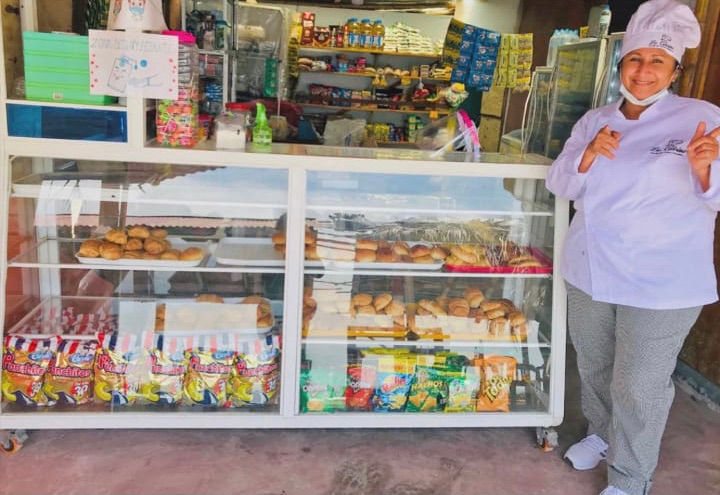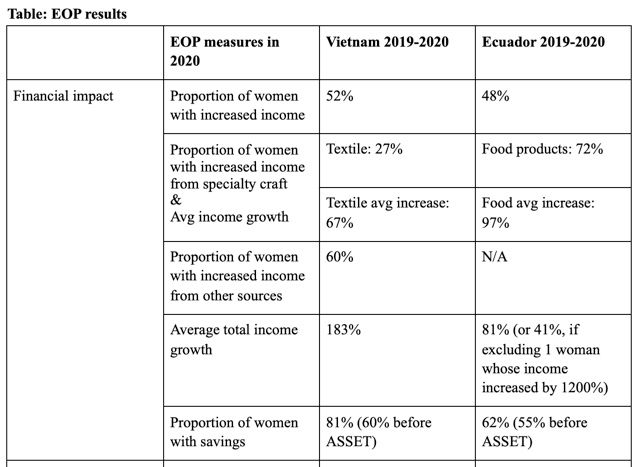It’s difficult to believe we have just crossed the 15-month mark since the entire world was put on lockdown due to COVID-19. As many parts of the world start to reopen and things finally take a hopeful turn for the better, we think it’s important to highlight the incredible resilience and strength the women we trained in 2019 and 2020 have demonstrated in the face of this pandemic.
In September and December 2019, our ASSET programs were run in Ecuador and Vietnam, respectively. Little did our trainers and artisans know, just a few months later, it would become more difficult than ever to apply entrepreneurship and business skills learned throughout the workshop.
To our amazement, our EOP (end-of-program) results, collected in February 2021, were better than we could’ve hoped for. Despite the challenges of the pandemic — challenges that were magnified for the women we trained given that they rely almost exclusively on tourism for income — our ASSET programs’ financial and empowerment impacts were quite significant. These results are summarized below and found in a table at the bottom of the page.
Vietnam, December 2019-2020
The Vietnam entrepreneurship program, which included a 2-day leadership training and a 5-day entrepreneurship (ASSET or Artistri Sud Social Entrepreneurship Training) program, trained 82 women, among which were artisans and tourism service providers. Upon completion of the workshop, these women joined a one-year-long one-on-one coaching program with Artistri Sud volunteers, allowing the graduates to apply their newly acquired knowledge and receive mentorship. Financial impact: One of the biggest difficulties these women faced during this pandemic was the loss of tourism, and the inevitable decrease in customers and income that would ensue, especially in the textile business. Remarkably, at our one-year follow-up, not only had 27.4% of the graduates interviewed increased their income from textile, but 59.7% had increased their income from other sources. This adds up to 51.7% of graduates experiencing an increase in total income. What is more, 81.25% of the women interviewed at the follow-up had managed to grow their savings in 2020, compared to 60% of women before the ASSET program. These results demonstrate our graduates’ future-oriented outlook on their work and finances, and their willingness to explore new opportunities in the face of the pandemic. Empowerment and confidence impact: One of the core goals of our ASSET program is the empowerment of our trainees. We measure empowerment by evaluating four criteria: willingness to take risks, ability to make decisions in matters that one finds important, confidence when interacting with others, and confidence in one’s ability to succeed. We were pleased to see our ASSET graduates succeed in all four of the above, on average.

The positive effects of their empowerment can be seen in the steps they took to expand their businesses after the training — 37.5% of the women interviewed had created new designs, 10.9% had sold their products in new markets, and 20.3% had found new customers. Sung Thi Lan, one of our graduates (take a look at her products here), said that before the training, many women artisans were reluctant about showing their products to new customers, out of fear of seeming like they were begging. Lan says they now understand it is something all businesspeople must do, and it has paid off!
Although factors such as distance, language, and gender role expectations still hindered some of our graduates from expanding their businesses to other cities, over half of our graduates reported having done something they never would’ve dreamed of doing before the training to achieve their goals. As Chao Mui Siet, one of our graduates, said, “before, I thought of going to Sapa to work, but my parents-in-law didn’t allow me to work far from home. After the training, I know I can decide it myself and go to Sapa to work without their permission”.
Finally, a large majority of the graduates interviewed reported feeling more confident in their ability to succeed and make changes around them and demonstrated more community involvement. In fact, after the training, the majority went on to mentor, support, and share their newfound knowledge with other women: “I share knowledge of gender equality to other women in the village”, said Chảo Sử Mẩy, one of our graduates. Others also got involved in local women’s unions and other community groups and had the confidence to voice their opinions, like Tan Ta May: “I feel more confident after the training. In my village, people organize meetings to educate people on how important it is to protect forests. I have confidently expressed my opinions during those meetings and dared to report people who illegally take wood from the forest, which I never did before”.
Ecuador, September 2019-2020
The Ecuador program similarly included a 2-day leadership training and a 5-day entrepreneurship (ASSET) program and trained 44 women. This was also the first entrepreneurship workshop to include three distinct types of entrepreneurs: traditional artisans working with textiles or handicrafts, food producers, and those working with natural medicine or cosmetics. Financial impact: It is worth mentioning the significant growth seen in the food production sector. Of the eleven trainees that were in this entrepreneur category, eight experienced an average increase in income of 98% per person. Of these women, one, named Marlene Samaniego, saw her income grow by $60 000 USD, or 1200%, compared to the previous year! Unfortunately, the textile, health, and cosmetics products sectors experienced a decrease in income due to the lack of domestic and international tourism, but we are confident that the situation will turn around as borders reopen. Empowerment and confidence impact: As mentioned, an important indicator of empowerment and confidence is the ability to take risks. One way this can be evaluated is through graduates’ willingness to leverage their resources and connections to succeed. Mayra Bangera, Marlene Samaniego, and Adriana Bladeon, three of our Ecuadorian graduates, are prime examples of this. After the training, these women acquired the confidence to promote their businesses in ways they had not done before. For instance, Mayra, who owns Seyva, an organic chocolate company, got the courage to bring her business to new heights, namely by investing in expensive equipment to reduce production costs and time. This willingness to take a risk for the sake of her company’s success paid off, as one year after the training, Mayra experienced a 327% increase in income.

Another impressive and heartwarming success story is that of Marlene Samaniego who, before the training, served meals part-time at a local restaurant. In 2020, the restaurant, located on the Jambelí Archipelago, closed down due to low tourism, pushing Marlene to find other income opportunities. That same year, Marlene also faced a tremendous personal obstacle: she fought and survived cancer. Despite this, she managed to become a certified chef and now runs her family-owned bakery on the Jambelí Archipelago. Her resilience and belief in her abilities certainly paid off, because, in 2020, Marlene reported an enormous 1200% income growth!
Finally, an important component of the ASSET program is the development of connections and networks among our graduates; Marlene and Adriana Bladeon are one example of the positive effects of women entrepreneurs supporting each other. When Marlene opened her business on the Jambelí Archipelago, the owner of the business space lent it to her freely, avoiding Marlene the extra costs of rent. Adriana, who was also looking to make an income in Jambelí in the food products sector, was invited by Marlene to use the upstairs section of the space to sell her fresh and frozen yogurts. Both women and their businesses have benefited from this collaboration, attracting customers with a delicious combination of baked goods and yogurt, and supporting each other in the process.

These results, summarized in the following table, demonstrate the valuable and widespread effects of confidence and empowerment in women’s lives, and we are incredibly proud of our graduates’ resilience during these difficult times.
Without our supporters, this work would not be possible, and we are beyond grateful for their generosity. Please join us in making an impact on even more women’s lives by donating to our organization.

Opmerkingen